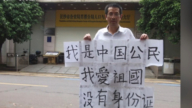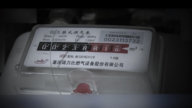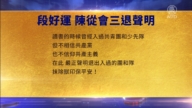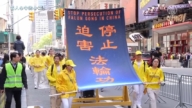【新唐人2013年02月27日訊】董正偉通過網路提交和發電子郵件方式,向環保部提交了兩份信息公開的申請函,一份是申請公開全國土壤污染狀況調查方法和數據信息;另一份是,申請公開全國土壤污染的成因和防治措施的方法信息。
董正偉說,他24號收到了環保部的公開答復函件。環保部答復說,全國土壤污染狀況調查數據屬於國家秘密,根據政府信息公開條例第14條規定,環保部不予公開。
北京律師董正偉:「他們本身隨意界定,這個是現有立法的缺陷問題。從幾十條規定來看,那麼環保信息,尤其是土壤污染信息的話,不屬於14條所規定的國家秘密。」
董正偉認為,此前,環保部多次對媒體指稱,土壤環境污染狀況調查數據報告,國務院批准後向社會公開。由此看來,土壤污染狀況數據十分嚴重,環保部不敢向社會公開。董正偉說,土壤污染狀況數據關係到每個公民的生命健康和居住環境安全問題,事關公共利益,環保部以國家秘密為藉口不公開,顯然不符合政府信息公開條例的主旨精神。
董正偉:「這個需要我們全體民眾拿出勇氣,從落後的、不文明的、不法制的一些現象、行為去做鬥爭,然後積極的行使法律的權力,來維護權力,來監督政府,監督地方行政,這樣的話,社會才會不斷進步。」
根據《新華社》2006年7月18號的報導,環保總局和國土資源部在當天聯合啟動了中國首次土壤污染狀況調查,這項調查經費預算高達10億元。但有關調查數據一直沒有公開。
而英國《每日電訊報》也在2月24號發表了中國的土壤污染問題。「英國廣播公司(BBC)」轉載了這篇記者湯姆•菲利普斯從中國發來的報導。
報導說,甘肅白銀市的專家們確信,當地居民的健康問題不是癌症,而是重金屬中毒。當地土壤和糧食中檢測出超量的鉛、銅和鎘。
中國民間自願環境保護者吳立紅表示,中國環境污染的根源在於政府腐敗。
中國民間自願環境保護者吳立紅:「因為讓這些各式各樣的污染企業生存,導致最後只能水污染跟土壤污染、大氣污染。那麼如果把這些關掉了,這個財政收入就沒有了。而且存在著地方政府欺上瞞下。它追求的一定是要利益,集體利益,個人從中撈利。他(政府官員)一年的工資,比如說,一萬塊錢人民幣一個月,一年12萬,如果他在裡面貪腐的話,這個股還是污染企業送給他的,他就不止拿12萬。」
報導說,有人確信土壤污染對中國經濟和人口是更大的威脅。有人估計,砷、鉛、銅、鎘已經污染了10%的中國耕地。報導還表示,去年10月,在進行為期6年的研究之後,中共國務院宣佈全國性「土壤保護」項目。儘管研究的細節未被公布,但是官方媒體說,這些「警示」了中國最高領導層。
吳立紅:「這些公僕而且不做事的呀!他拿了共產黨的錢、正當的錢,他不幹實事,專門撈好處,為親戚朋友撈,為自己的家人撈,變著方法撈。所以這些人民的公僕,家裏面都有企業的。」
吳立紅是江蘇省宜興市周鐵鎮的農民,他從1990年代初開始關注當地的環境問題。1998年以來,他不斷向媒體和官方舉報當地工廠污染太湖的情況。近十年來,他先後舉報200多家企業非法排污行為,而被中國大陸媒體譽為「太湖衛士」、「環保英雄」。
採訪/田淨 編輯/周平 後製/鐘元
National Soil Pollution Data: State Secret or Public Asset?
In 2006, the Ministry of Environmental Protection (MEP)
and the Ministry of Land and Resources (MLR) conducted a joint soil pollution survey.
However, the data is yet to be made known
to the public.
On January 30, Beijing lawyer Dong Zhengwei requested
MEP to publicize the survey data.
MEP replied that the data is a “state secret”
and cannot be disclosed.
The public believes the soil pollution data is closely related
to people’s health.
Thus MEP cannot simply use the excuse of “state secret”
to deprive the public from its right to known.
Via online submission and email, Dong Zhengwei
submitted two requests urging the MEP to release the data.
One of the submissions requested to publicize the methods
used during the investigation and statistical data;
the other requested to publicize the cause of soil pollution
and the prevention measures.
Dong Zhengwei says, he received an official reply
on February 24.
The MEP wrote, “The National Soil Pollution survey data
is a state secret, according to the provisions of Article 14 of the Open Government Information Regulations.”
Dong Zhengwei: “They make decisions according to their
will; this is a shortcoming of the currently existing legislation.
From the existing dozens of regulations, environmental data,
especially soil pollution, does not count as a state secret, as defined by Article 14.”
Dong said, prior to this, MEP told media several times,
they would release the results after State Council’s approval.
However, Dong thinks the ministry did not release
the data because it shows how severe the pollution is.
Soil pollution data closely relates to the Chinese
citizens’ health and life safety, Dong explained.
It is also associated with public interests.
Not releasing the data with the excuse of being “state secret,”
the MEP is obviously acting against the spirit of Open Government Information Regulations.
Dong Zhengwei: “This requires all of us to summon up our
courage, to struggle against an uncivilized and illegal actions.
Then actively implement the provisions of the law,
to uphold our rights, to supervise the government.
Only by doing so can our society move forward.”
According to Xinhua News report from July 18, 2006, MEP
and MLR jointly held a nationwide soil pollution survey.
The survey cost one billion RMB (US$159 million),
yet the results have never been released.
On February 24, UK’s Daily Post reported
on China’s soil pollution.
The BBC circulated this report,
written by Tom Phillips from China.
The report said, experts in Baiyin City of Gansu province
believe firmly that the cause of the locals’ health problems is not cancer but heavy metal poisoning.
The soil and grains had been detected to contain
an excess of lead, copper and cadmium.
Wu Lihong, a volunteer at an environmental protection NGO,
thinks the cause of pollution in China is rooted in corruption.
Wu Lihong: “Because different kinds of environmentally
unfriendly enterprises are allowed to exist, the water, soil and the atmosphere are all contaminated.
However, if these enterprises are shut down,
the financial benefits would be gone.
There exists the problem of local government
lying to the levels above and below it.
What it pursues is definitely benefits and group interest.
Individuals often fish for gains.
Say a government official’s salary
is 10,000 RMB a month.
If he gets involved with bribery, then he gets stocks from
enterprises, making much more than 120,000 RMB a year.”
Reports say some people firmly believe soil pollution
is a greater threat to China’s people and economy.
Some estimate that arsenic, lead, copper and cadmium
have already polluted 10% of China’s agricultural land.
Reports also show that in October last year, after a six year
research, China State Council announced a national “soil protection” project.
Though the research details have not been made public,
state-run media said, this cautioned leaders at the highest level of the Chinese Communist Party (CCP.)
Wu Lihong: “These public servants don’t do anything!
They take CCP’s money and do nothing practical, but fishing for gains for friends and relatives.
They change methods to fish for gains.
So these people’s servants all have their own enterprises.”
Wu Lihong is a farmer of Zhou Tie County in Jiangsu, who
started paying attention to local environmental problems in the early 1990s.
Since 1998, he had been reporting the pollution problem
of Tai Lake to the media and government.
For more than 10 years, Wu reported over 200 cases
of illegal sewage disposal by various enterprises, and is crowned “Tai Lake Soldier” by the Mainland media.




























